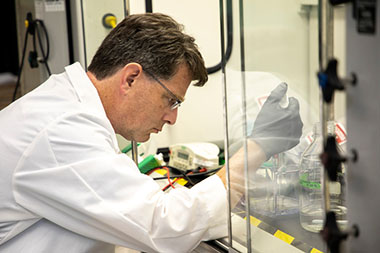A Critical Factor
A UAlbany neuroscientist researches the effects that insulin has on our ability to form new memories and recall old ones
 |
|
Associate professor Ewan McNay, pictured here in his lab, is conducting long-term research on the connection between type 2 diabetes and memory processing diseases. Photo by Patrick Dodson. |
ALBANY, N.Y. (July 25, 2019) – A University neuroscientist is working to understand the connection between type 2 diabetes and memory processing diseases such as Alzheimer’s – finding that insulin affects the brain in more ways than previously believed.
Ewan McNay, an associate professor and area head of behavioral neuroscience in the Department of Psychology, explains that a long-standing belief held by the medical community is that insulin, the central regulator of blood glucose, does not affect memory or indeed the brain. “But years of research has shown that’s not true,” he said.
Building on his previous work looking at brain metabolism during cognitive tasks, McNay has been working on determining the exact ways by which insulin does affect memory. One recent study published in the peer-reviewed journal Behavioral Brain Research identified the insulin-regulated glucose transporter GluT4 as a central target of insulin in the brain. This is the latest step in more than a decade of research, including the original published finding that the hippocampus actually requires insulin to form memories.
The hippocampus is the brain's memory center, buried under the cortex, and is responsible for regulating both the formation of new memories and the transfer of information between short- and long-term memory. McNay explains that impairments in memory are central not only to Alzheimer’s disease but also many other neurocognitive disorders, including type 2 diabetes – and around 100 million Americans have either diabetes or pre-diabetes. Inability to get glucose to the brain when and where needed can be a critical factor in such impairments, and according to McNay, is seen in Alzheimer's. He and his colleagues believe that GluT4 may be a key link between several diseases, including specifically type 2 diabetes and Alzheimer’s disease.
This recent work was performed with Jiah Pearson-Leary, a graduate student in McNay's lab who is now working at the Children’s Hospital of Philadelphia. It is the latest step in 25 years of work and discovery for McNay.
“Research during my graduate years showed that memory performance is limited by glucose availability, so we moved on to looking at what exactly might regulate glucose – and insulin seemed to be an obvious choice,” he said. “Now, we're looking at disease states where insulin's role is impaired.”
McNay completed his PhD at the University of Virginia and did post-doctoral work at Yale, working in neuroendocrinology, before joining UAlbany in 2008.
His lab’s current work entails probing the different ways that insulin regulates memory, and McNay said it appears to vary across the stages and mechanisms of memory. They are looking at several factors, including the interaction between insulin and beta-amyloid, a protein that accumulates in the brains of those with Alzheimer’s disease and creates dysfunction in brain metabolism. They’re also looking at related factors: for example, the role of zinc in regulating hippocampal memory, the impacts of hypoglycemia, and the effects of different diets, such as a high-fat diet.
“We know that one of the greatest risk factors for the development of late onset Alzheimer’s is being a type 2 diabetic” says McNay. “We're at the stage where we are identifying exactly why that is the case, including the specific molecules and signaling pathways involved, and this should guide the next steps of preventing and perhaps treating Alzheimer’s Disease." He cautions, though: "Right now, one thing that we know is that there's a long build-up to Alzheimer's in most folks – and the best thing that you can do to reduce your risk is lose weight and get to the gym!"
![]() For more news, subscribe to UAlbany's RSS headline feeds
For more news, subscribe to UAlbany's RSS headline feeds
A comprehensive public research university, the University at Albany-SUNY offers more than 120 undergraduate majors and minors and 125 master's, doctoral and graduate certificate programs. UAlbany is a leader among all New York State colleges and universities in such diverse fields as atmospheric and environmental sciences, business, education, public health,health sciences, criminal justice, emergency preparedness, engineering and applied sciences, informatics, public administration, social welfare and sociology, taught by an extensive roster of faculty experts. It also offers expanded academic and research opportunities for students through an affiliation with Albany Law School. With a curriculum enhanced by 600 study-abroad opportunities, UAlbany launches great careers.


